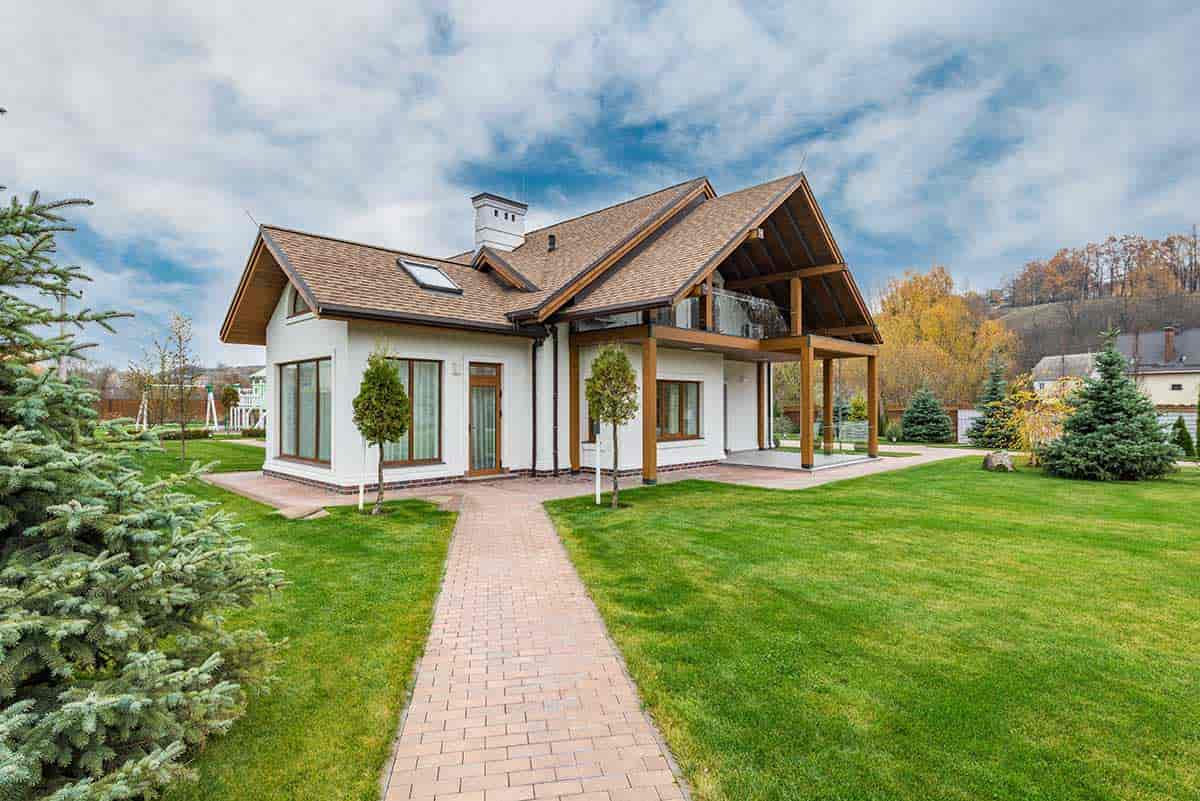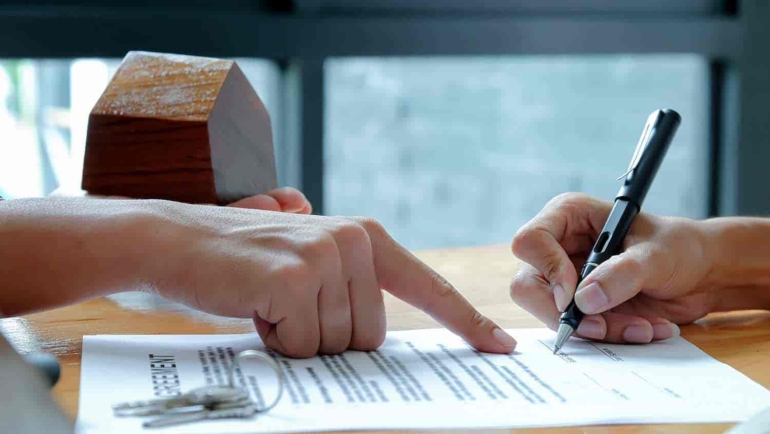Technically, it is cheaper to build a house than to buy a house. However, homeowners who take this route aren’t just building a house: they’re also buying land to build it on. And when you factor these costs in, buying a home becomes the more affordable option.
It costs roughly $300,000 to build a new home and roughly $500,000 to buy your own land and build a home on it, according to the National Association of Home Builders’ (NAHB). Alternatively, buying a home costs $330,000 on average, according to 2020 data from the National Association of Realtors (NAR).
This data reflects national averages, so it’s not true for all homeowners. But there are more costs involved in buying land and building a home than there are for buying a home that’s already built.
What Kind Of Costs Go Into Building From Scratch?
The total construction cost of building a new home is $296,652 according to the NAHB’s 2019 construction cost survey. Factoring in the cost of buying land and other related expenses, the final price rises to an average of $485,128.
This is based on an average lot size of roughly half an acre (22,094 square feet, to be exact) and an average finished area of 2,594 ft. (i.e., the house itself).
Here’s a breakdown from the NAHB of what costs go into building from scratch:
- Site work, such as building permit fees, impact fees, water and sewer inspection fees, architecture, and engineering ($18,323 on average)
- Foundation work, such as excavation, foundation, concrete pouring, retaining wall construction, and backfilling ($34,850 on average)
- Framing work, such as framing, trussing, sheathing, and the cost of materials such as metal and steel ($51,589 on average)
- Exterior finishing work, such as finishes for the exterior walls, roofing, window and door installation, and garage door installation ($41,690 on average)
- Interior finishing work, such as insulation, drywall, trims, painting, lighting, cabinets, countertops, appliances, flooring, plumbing fixtures, and fireplaces ($75,259 on average)
- Major systems work, such as the plumbing, electrical, and HVAC (not including fixture installation) ($43,668 on average)
- Wrap-up work, such as landscaping, outdoor structures (deck, patio, porch, etc.), driveway, and cleanup ($20,116 on average)
- Other fees not related to these costs ($11,156 on average)
Of course, those are just the building costs, otherwise known as construction costs. There are several other costs associated with building a new house that interested buyers will need to consider.
- Finished lot cost, including financing cost: $89,540
- Financing cost: $8,160
- Overhead and general expenses: $23,683
- Marketing cost: $4,895
- Sales Commission: $18,105
- Profit: $44,092
Including the construction costs of the house itself, this adds up to an average total sales price of $485,128.
Overall, the cost of construction accounts for roughly 61% of the final cost, while the land only accounts for roughly 18.5%. The other $20.5% comes from the costs provided above.
Keep in mind, these specific numbers are based on averages. Costs may vary according to geographic location and contractor. These factors will primarily influence costs for labor, land, and materials.
Why A Good General Contractor Is So Important
When you build your own home, the quality of your house depends on the quality of your contractor. A professional, certified general contractor will be able to walk you through the process of building a house and ensure the final product meets your and the government’s standards.
Though some states allow homeowners to act as their own contractor, a licensed professional will know the ins and outs of buying a land and building a home. They’ll be able to source safe materials, make suggestions on how to stay within budget, and provide time-tested feedback on any desired features.
A good general contractor will also be able to recommend other reliable professionals, such as interior designers, architects, landscapers, real estate attorneys, and more.
Here are some tips on how to separate good contractors from the not-so-good:
- Licensing and Insurance – A professional contractor should be able to show you their license and certificate proving insurance.
- Clear Contracts – Professional contractors have clear contracts that outline the job in detail, including all the associated costs and fees.
- Competitive Pricing – Cost doesn’t necessarily equate to quality. Look out for contractors that vastly underbid compared other estimates and contractors whose quotes are much higher. Instead, go with a contractor whose quotes are in line with the current market.
- Customer References – Clients are who build a contractor’s reputation. A professional contractor should be able (and willing) to provide customer references. You should also be able to see the contractor’s work, both completed and in progress.
- Communication – Communication is key when building your own house. A good contractor should provide a phone number or email, be easy to reach (at least during business hours), and responsive.
The best contractors should make the land buying and home building process as easy as possible for you. They’ll take care of the majority of the paperwork, such as obtaining building or remodeling permits, but keep you up to date on any progress or requirements on your end.
And for any renovation work on painted surfaces in homes built prior to 1978, make sure your contractor is an Environmental Protection Agency (EPA) Lead-Safe Certified Renovator.
It’s also wise to check out the Better Business Bureau (BBB) to see if a specific contractor has had any complaints or allegations filed against them.
The Pros Of Buying Your Own Land And Then Building
There are a number of benefits to buying your own land and then building a house, which is why this is such an attractive option for so many people. The biggest pros include options for customization, control of the land, decreased maintenance, pricing package options, and less market competition.
- Customization – When you build your own home, you can custom-make it to fit all your needs. This can include up- or downgrading appliances, changing standard features, adding to the floor plan (such as basements or decks), and controlling the room layout.
- Land Utilization – Similar to how you control what the house will look like, you’ll also control where the house is placed. You can choose how close it is to any other houses, bodies of water, roads, property lines, trees, ditches, etc.
- Maintenance – New homes typically come with less maintenance and upkeep because they haven’t had time to break down. So while you’ll still have to do yardwork, you’re not likely to have to replace the roof or HVAC system anytime soon.
- Pricing – Depending on your contractor, you may be able to roll certain features into the price of building your home that aren’t offered when you buy a home. For example, a contractor may include landscaping or warranties in their estimates.
- Competition – Whereas it can be extremely difficult to find and purchase a home when the housing market is booming, the market for land purchases is less competitive. And, of course, there’s no competition at all once you have the land.
There’s plenty of benefits to buying your own land and then building. And when the housing market is lackluster or too competitive, it’s certainly an attractive option. But make sure not to just focus on the pros: it’s important to carefully research the drawbacks, as well.
The Cons Of Buying Your Own Land And Then Building
There are just as many cons as there are pros to buying your own land and then building a home on it. Some common drawbacks are related to final expenses, cost negotiation, loans and financing, overall timelines, and stress.
- Expense – According to the NAR, the average cost of buying a home in 2020 was $331,900, which is more affordable than the average cost of buying a land and building a home. Keep in mind, this doesn’t include seasonal or geographic adjustments.
- Price Negotiation – Whereas you’re able to haggle (to an extent) on existing homes for sale and negotiate costs for the seller to cover, it’s much harder to negotiate with general contractors. There is little to no leeway in terms of closing costs or purchase prices.
- High-Risk Loans – While there may be more flexible financing options in terms of general contractors, construction loans are considered higher risk than traditional or FHA loans and have higher interest rates. As such, you’ll need a higher down payment.
- Timeline – Buying land and building your own home will take longer than buying a home that’s already constructed. Factors like weather and material manufacturing delays can further extend the timeline.
- Stress – Real estate is a stressful business, whether you’re buying or building. But with building your own home, there’s an added amount of stress since so many of the details are your responsibility, from picking out cabinet colors to creating a contracting budget.
There are benefits and drawbacks to both buying a home and buying land to build a home on. Before you decide which is right for you, you’ll need to carefully consider what each process entails. Weight the pros against the cons to see how you want to move forward.
If You Want To Build Your Own Land, Here Are Some Resources To Help You Get Started
Buying your own land and building a house is an exciting process, but can also be daunting. To help interested homebuyers, there are several resources offered by agencies such as the NAHB and NAR to get the process started.
Local Home Builders Association Directory
If you’re considering buying land and building a home, the Home Builders Association (HBA) Directory can provide you with a list of local, qualified builders and remodelers in your area.
The HBA Directory allows you to filter by state, city, and council. This last filter refers to specific home and builder types, such as 55+ housing, education licensees, multifamily builders, remodelers, professional women, etc.
Once you enter your criteria and search, you’ll be provided with the local HBAs near you. From there, you can navigate to their website and see the nearest contractors, as well as their specialties.
For example, a contractor may specialize in general contracting, custom builds, remodeling, single or multifamily homes, trusses, electrical work, etc.
Using this resource, you’re guaranteed to find a good general contractor.
Land Use And Property Rights Resources
When you want to buy land and build your own home, it’s useful to peruse the NAR’s resources on land use and property rights. Their database covers topics a wide variety of topics, such as hazards and disclosures, zoning, sustainability, transportation and infrastructure, and more.
Here are some of the other topics you’ll find:
- Eminent Domain
- Smart Growth
- Environmental Issues
- Cell Phone Towers
- Agricultural and Farm Land
- Low Incoming Housing and Property Values
- Trails and Greenways
- Golf Courses
The NAR also offers other resources on residential real estate topics like curb appeal, design trends, design and architecture, home systems and utilities, resource efficiency, and more.
It’s useful to educate yourself on these topics prior to starting the process of building your home. This way, you’ll be more prepared in terms of land use and the specifics of what you want in your home (and what’s feasible to have).
Final Thoughts: Building Vs. Buying A Home
Though building a new home costs an average of $296,652 and buying a new home costs $331,900 on average, those aren’t the only costs that homeowners have to consider. Once the cost of buying land, paying a general contractor, and other fees are factored in, the average cost of building your own home rises to an average of $485,128.
However, that doesn’t mean that buying land and building your own home isn’t the right option for you. Rather than just looking at price alone, it’s important to thoroughly investigate the process to see if it would be the best way to fulfill your housing needs.




